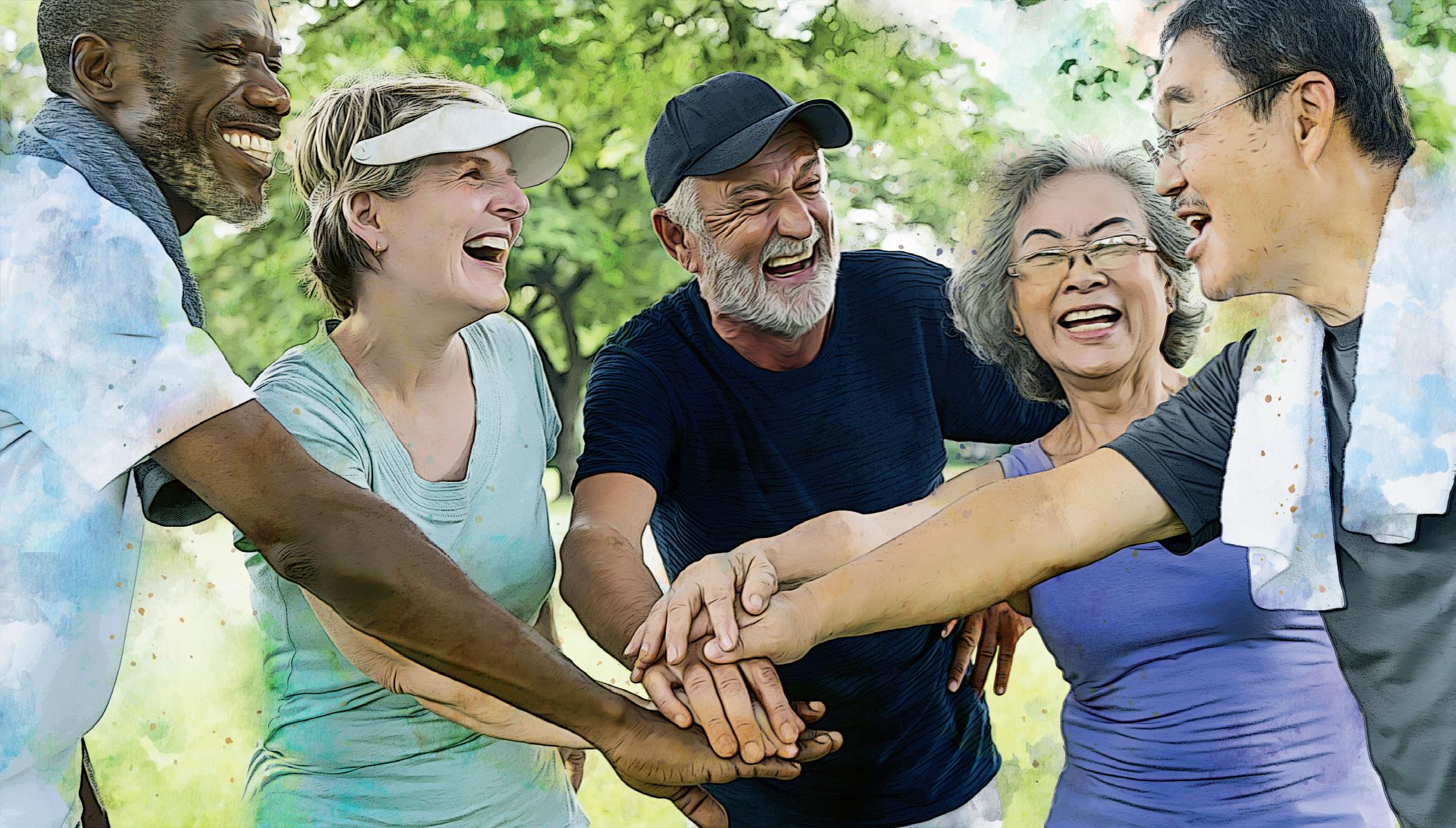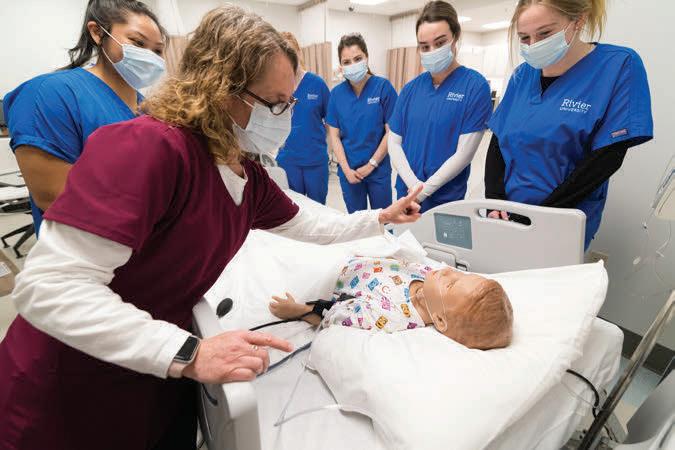
4 minute read
Making New Friends
Developing new relationships is critically important for long-term health
BY LYNNE SNIERSON / ILLUSTRATION BY RAW PIXEL
Friendship is one of the most cherished relationships we can have at any age. Yet the older we get, the smaller our social circles become, making it imperative for seasoned citizens to cultivate brand-new close companionships. Developing novel relationships is critically important for this age group, especially as they start losing other valued connections.
Rebecca Kentner, coordinator of the Referral, Education, Assistance and Prevention (REAP) program at the Center for Life Management in Derry and Salem, agrees wholeheartedly. “Having close relationships with somebody their own age is invaluable for seniors,” says Kenter, who is a certified specialist who counsels seniors exclusively. “It is not uncommon for the clients I work with to have some level of loss or grief, whether that pertains to the fact they’ve lost a spouse, a partner, a child, a pet, a friend or another loved one.”
Kentner explains that heartbreak can be intensified by ambiguous grief, which is the sorrow and anguish that come from factors not initially apparent. They include the loss of abilities, mobility, a driver’s license, independence, a home, a community, a career and self-esteem, among other things. Experts universally agree that if seniors in these situations don’t make new friends, they invariably end up feeling isolated, lonely, depressed and even hopeless.
Loneliness has long been associated with the progression of Alzheimer’s disease, dementia, obesity, diabetes, hypertension, cardiovascular disease, alcoholism, substance abuse, smoking and a lowered immune system. These conditions, needless to say, negatively affect quality of life and longevity.
“Developing new friendships for the elderly is very important because it can help them maintain good mental health,” says Dr. Karen Roberto, former coordinator of the gerontology program at the University of Northern Colorado, in a 1987 New York Times article. “Those who have several friends report greater feelings of independence and worthiness than those who don’t.”
As seniors experience the inevitable cycle of ups and downs, new friends can be a source of support and comfort to help weather the “life-quakes,” big and small, and these buddies become a lifeline in the tough times. In the good times, they’re somebody to share the joys and simply have fun with.
Professionals agree that relying on family instead of friends can be a mistake, and a big one at that. It’s trite but true that friends are the family we choose. As the classical Greek tragedian Euripides wrote thousands of years ago, “One loyal friend is worth 10,000 relatives.”
“Family can come with a whole bunch of stuff,” says Kentner. “There can be a lot of dysfunctions. We love them, but they can bring a lot of baggage, stress and anxiety to the relationship. Friendships are really different from family relationships; they are not meant to fill the same areas. Their function is different and what we get from those relationships is different, and it’s meant to be that way.
“When you’re in a relationship with a friend, one that you have chosen, you have
Reap the Rewards
The Center for Life Management offers the Referral, Education, Assistance and Prevention (REAP) program for older adults (60 and older) who are New Hampshire residents and are not active clients of the mental health center.
According to its website, this program delivers short-term confidential counseling and educational services at no cost to the individual. Typically, services are provided in the home or community. REAP is designed to assist older adults with a broad range of concerns that impact an older adult’s well-being: life changes/losses, stress, housing and safety concerns, mental health concerns and problems related to medication misuse or alcohol.
These services are also available to family members, caregivers and professionals who are concerned about an older adult. This program also provides educational sessions on topics that are of interest to older adults. Educational sessions are typically offered at senior housing sites or locations frequented by older adults such as senior centers.

The REAP program is state-funded, supported by the NH Housing authority, DHHS Bureau of Elderly and Adult Services, DHHS Bureau of Behavioral Health and DHHS Bureau of Drug and Alcohol Services.

If you have questions about the REAP program, contact the REAP referral line at (603) 965-0655 or the Center for Life Management at (603) 437-1577 and centerforlifemanagement.org.
camaraderie,” she continues. “You’ve had the same experiences. There are areas of your life, areas of functioning, that you can connect with because you ‘get’ each other. Friends don’t have the same expectations as family. With them you can just be.”
True friendship gives us that wonderful and unique human connection that protects from stress and allows us to feel safe, seen and heard. By the time one reaches their golden years, they’ve (hopefully) learned to be more discerning and selective.
“It’s quality over quantity,” says Kentner. “Brené Brown (professor and best-selling author) talks about forming relationships and how we all have trust marbles that are required to be put in a jar. We require things for our friendships such as trust, comfortability, time spent and mutual respect. It takes time and opportunities for someone to be able to put those marbles in our jars. We have a higher expectation of the quality of those marbles and how many there are.”
But how do seniors make new friendships that are meaningful?
“When we seek out friends, we’re typically looking for key things,” Kentner says. “They include respect, honesty, loyalty and com- mon core values — common core values are fundamental to friendship. If you’re going to talk with somebody about the things that are most important to you — the things that really matter, the things that you really care about that are going on in the world, the things that are impacting your life directly — not having core values is going to be the deal breaker.”
So while it may be intimidating at first, it’s important to pick yourself up, put yourself out there, take a risk and attempt to forge solid friendships. Join your local senior center or a faith community if you’re spiritually inclined. Attend community events. Take a class or continuing education course to meet people with a shared interest. Volunteer for a charitable organization whose mission is close to your heart or for a political campaign you believe in. Accept and extend invitations.
Most of all, have a good attitude, stay positive and keep your heart open.
“Everyone starts out as an acquaintance,” Kentner says. “Make that effort. Take that first step. If you want to be able to build a real relationship, you have to be able to put those marbles in your jar.” NH










